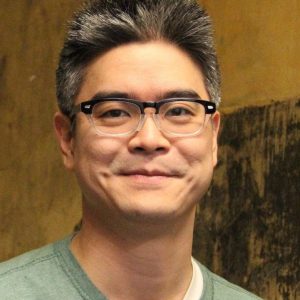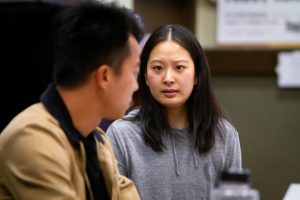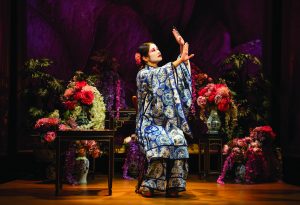As rehearsals were gearing up for The Chinese Lady, dramaturg Yiwen Wu (YW) posed a few questions to New York-based playwright Lloyd Suh (LS) about the reverence he has for Afong Moy, the value of interrogating social constructs, and how he thinks about his connections with a broader cultural conversation.

(YW) What first attracted you to the story of Afong Moy?
(LS) I was doing research on a different play—a play that was about, in many ways, the history of stereotyping—when I came across Afong Moy and her story. It just stuck with me. I wasn’t even thinking about a potential play at the time, it was just something that I wanted to know about personally, and try to find out as much as I could.
It resonated with me on the level of conversations I’ve had with other peers in the performing arts around the performance of ourselves, really. What does it signify when I do this? What do people see when I do this? What is the perception, and what are the ways in which I don’t even know how I’m communicating something when I’m on stage or going through life? The more I started thinking about that, the more I started thinking about how it might be a play, because of the performative nature of it. That’s where it all began.
(YW) Could you tell us a little bit more about the resonance you felt with Afong Moy?

(LS) My initial impulse was the performative aspect, but then it changed. As I was going through it, there was a point where I felt like, oh, I don’t know how to end this. I don’t know if this play has an ending, because the history of Afong Moy was lost to us. She disappeared, she was forgotten, she was discarded. But I had begun to revere her, to see her as a very important part of American history, of history in general, world history, human history. I didn’t want to be in a position of making stuff up, so I put it away for a little while.
But Afong Moy continued to haunt me. I sat with the question of, why was she forgotten? And then I started to think about the reasons she was forgotten being still with us today.
(YW) What are your thoughts on the term, Asian American?
(LS) My relationship with that term is evolving, and it changes. I’m totally self-aware of the fact that it is a social construct, but I also think that lots of social constructs are valuable.
I’m a playwright. I deal in fiction. I’m interested in social constructs. I’m maybe more interested in the things we socially construct than the things that are naturally constructed, or whatever.
Like, how do you define American? What does it mean to say you’re an American? Where is there solidarity? I’m interested in that both as a citizen and as a writer. I’m interested in where is there solidarity and where is solidarity possible, and how does that affect our day-to-day life? How does that affect our citizenship?
I think as citizens, we strive to identify the ways in which we have solidarity with other Americans. And in that, Asian American is useful insofar as it allows us to consider the ways we have a different kind of solidarity.
(YW) What are some of your biggest artistic influences?

(LS) Here in New York, I’ve been part of an extended community. Early in my writing life, I felt like part of a community of other Asian American playwrights. Over the past 10 years, it became just a wide diversity of playwrights from all over the world. It’s given me this feeling that my work is in conversation with a broader ecology of writing. I’m not just writing purely out of my own impulse, in my own ego, but I’m part of a larger cultural, global conversation of what we’re trying to express as an art, but also what we’re trying to express as just a collection of voices.
I worked for 10 years in new play development, and I was able to develop really lasting relationships with hundreds of other writers, and a lot of them are some of my closest friends. I think about how my work is in conversation with theirs and how our work collectively is in conversation with a broader cultural conversation that’s happening politically, globally, all that.
(YW) In an interview in 2019, you said that this play is about empathy and how valuable it can be to strive for understanding. Since then, has the key message changed?
(LS) I’ll be honest, I haven’t thought about it in those terms. As I think about it now, I would frame it a little differently. I would say that what I’m really interested in is, what does it mean to be an American? There’s something that urgent about it.
It feels like at this moment, this country is really seriously reckoning over our history. I think it’s still true what I said before, but what’s going on in the world right now makes me feel like there’s something a little more urgent on the table right now, that it goes deeper, or is becoming more specific, somehow.
I genuinely think Afong Moy is an important figure in human history. As we reckon with what it is to be an American living in this time, we have to reckon with the ways in which history erased her, but also just add her in general to our understanding of history.
(YW) Do you have upcoming projects we should keep an eye out for?
(LS) I have a few other plays. The biggest one is called Exclusion, on the legacy of the Chinese Exclusion Act and in particular, the experience of migrants who were detained on Angel Island. Another play, The Heart Sellers, is rooted in more contemporary history—the 1970s around the legacy of the immigration reform Hart-Celler Act. That play, which focuses on two recent immigrants, one from South Korea and one from the Philippines, as they attempt to find unexpected solidarity with each other in a small American city, will be at Milwaukee Rep in the early spring of 2023.
Learn more about The Chinese Lady and get your tickets today!

One Response to “An interview with playwright Lloyd Suh”
Ana Carrillo
It is so sad, quite tragic indeed, that the commonality that serves to constitute solidarity within a group -social, ethnic, religious or other- is precisely what has functioned as a way of parceling for exclusion by others who do not have a share in the group´s characteristics. There is a shortsightedness throughout human history which labels “the other” (whoever does not look or think like I do) as an immediate candidate for exclusion. Solidarity should be universalized, not simply solidarity with a particular group, but with the human race as a whole, and even beyond, with the entire spectrum of living beings.